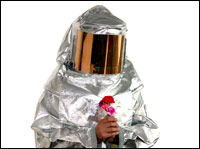
Gregg Small.
What’s your job title?
Executive director of the Washington Toxics Coalition.
What does your organization do?
WTC works to protect human health and the environment from the impacts of toxic pollution.
What are you working on at the moment?

Photo: iStockphoto
A top priority right now is our Pollution in People Project. For many years, the environmental movement has been focused on preventing pollution of our air, water, and soil. Sadly, those are not the only problem areas anymore. The fact is that every single one of us is now contaminated with pollutants in our bodies that we didn’t ask for. In May, WTC released a report that examined the levels of more than two dozen highly toxic chemicals in the bodies of 10 Washingtonians. The results were alarming, showing that even people living healthy lifestyles have high levels of mercury, flame retardants, pesticides, and other chemicals in their bodies. We are working to educate the public about this issue, and are pushing for policy reforms to phase out the use of some of the most toxic substances on the planet and replace them with safer substitutes.
How do you get to work?
Four-mile car ride.
What long and winding road led you to your current position?
In college, I was required to take a full-year lab science. Not being much of a hard-science guy, I learned that the easiest course was environmental science. So I took it, and I became enthralled with the issues. My first job out of college was with Green Corps, an incredible training program for recent college graduates who want to be environmental organizers. My life was changed, and I have been organizing ever since — first in Vermont, then in Washington, D.C., San Francisco, and Seattle. While my title for the past 10 years has been executive director, I still consider myself an organizer.
Where were you born? Where do you live now?
I was born in Pittsburgh and have lived in Seattle for the past five years.
What’s been the best moment in your professional life to date?
Completing my yearlong training with Green Corps in 1993. That year gave me the skills and confidence to do what I do every day now.
What environmental offense has infuriated you the most?
Mountaintop-removal mining. It is truly amazing to me that we allow mountaintops to be blown apart for mining, and then allow our rivers, lakes, and streams to be polluted with the debris. This is legal in our own country. It boggles my mind.
Who is your environmental hero?
Martin Luther King Jr. While not an environmental activist, MLK is my driving inspiration to help build the movement that we need to protect our health and the environment. His dedication and leadership inspire me every single day.
What’s your environmental vice?
Like many people, it is my car. I only drive about 50 miles per week, but it is more than I should.
How do you spend your free time (if you have any)?
Hanging out with my wife Pam and our almost-two-year-old daughter Lillian.
If you could institute by fiat one environmental reform, what would it be?
A fundamental reform of the laws that are designed to protect our health and the environment from toxic chemicals. Our federal and state laws simply don’t work, and we need an entirely new system in place. We should start by phasing out the use of the most hazardous chemicals, requiring manufacturers to provide data about the health and environmental impacts of the chemicals that they produce, and investing in cleaner ways to produce the products that we want.
Who was your favorite musical artist when you were 18? How about now?
When I was 18, the Beatles. Now it’s the Beatles, Bob Dylan, and Wilco.
What’s your favorite movie?
If you could have every InterActivist reader do one thing, what would it be?
There are so many opportunities to make a difference in protecting the planet. The most important thing is to pick one and really do it. If you have spare time, volunteer with a group that you like. If you have money, donate as generously as you can. If you have limited time, call a legislator once per month on an issue that you care about. The most important thing is to get involved. Reading a book about the problems isn’t going to get it done. Dedicating your skills and resources will. Don’t just read, act!

